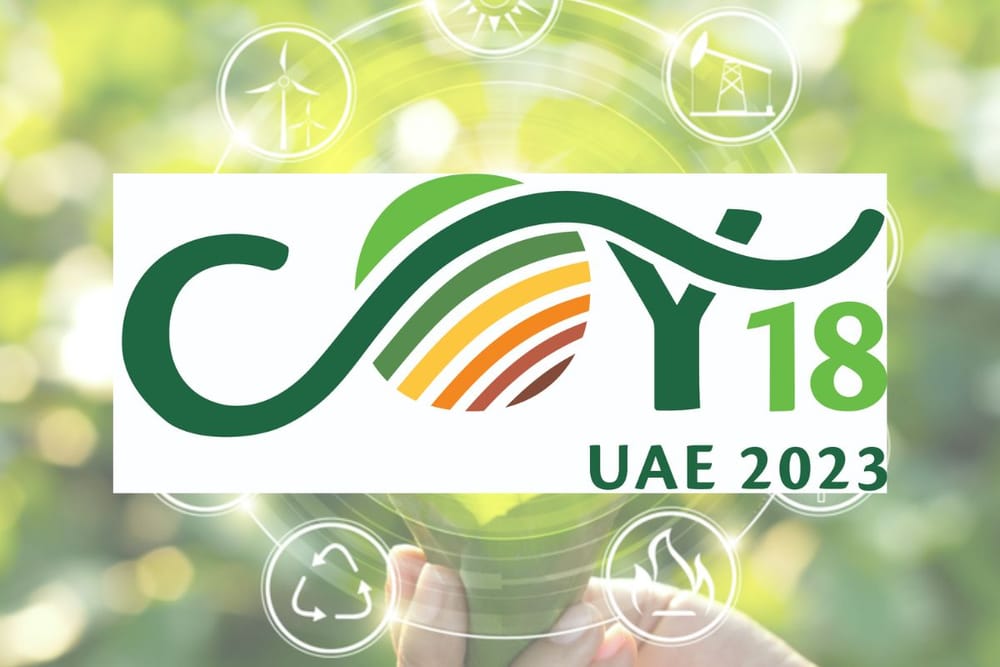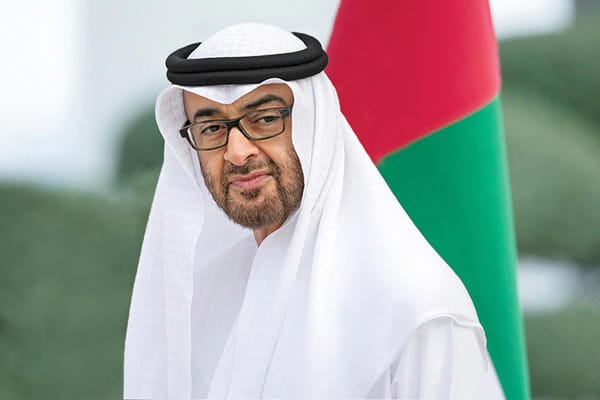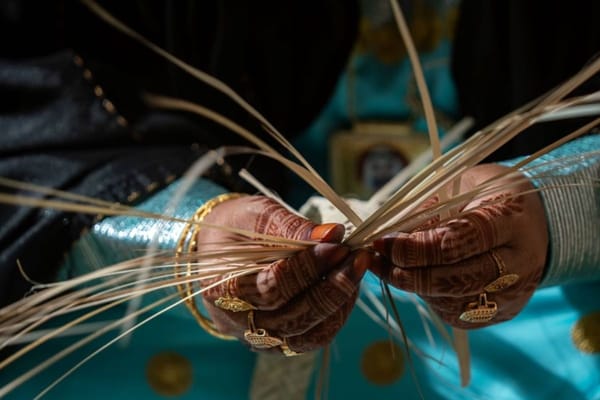The 18th edition of the United Nations Youth Conference (COY 18) which commence on Sunday, November 26th, at Expo Dubai addressed many critical issues faced by the global community on climate change.
Trailblazers: The Arab Youth Technology Fellowship Ceremony
COY18UAE featured a session highlighting the Arab Youth Technology Fellowship (AYTF) and its role in cultivating a sustainable future through technology.
Over 60 attendees gathered to explore the technical solutions devised by young participants and the positive impact of the AYTF program on their knowledge and skills.
The Arab Youth Center (AYC) actively engaged in COY18, showcasing its Arab Youth Technology Fellowship (AYTF) Program.
The program's core objective is to raise awareness among youth about the pivotal role of technology in achieving sustainable development goals, a crucial focus as the UAE gears up to host the forthcoming COP28 conference dedicated to the 2030 Sustainable Development Goals.
A key program goal is to empower youth with the skills to harness technology and artificial intelligence (AI) in advancing the 2030 Sustainable Development and COP28 objectives.
The session featured presentations on the innovative outcomes of former participants during COY18, spotlighting their journey, knowledge, and expertise gained through the AYTF program.
Mai Ismail, an AYTF Alumni, and David Lais, a climate activist and co-founder of Ecolytiq, led a panel discussion during the session.
Mr Lais said:
“The session revolved around harnessing technology to construct more sustainable societies. Its focus was on utilizing technology for education, making it more accessible and tangible to people. We help people to understand their day-to-day tasks and to demonstrate practical ways of integrating technology into their routines.”
Moreover, Mai Ismail emphasized,
"The fellowship program aims to empower and showcase the capabilities of emerging talent in advanced technology, artificial intelligence applications, and the digital economy."
The AYTF not only benefits the youth and policymakers in the Arab world but also contributes to global advancements in technology and sustainable development.
The program envisions preparing a generation of youth to lead the technology and digital landscape in the region, offering Arab youth the opportunity to learn from key experts in digital and technology fields.
The current edition of the program, its third, places a strong emphasis on the transformative power of technology, aiming to train youth to become pioneers in advanced technology capable of crafting innovative solutions across multiple sectors in the Arab world.
This edition focuses on three main themes: technology, sustainability, and climate change, with 30 young men and women from 12 Arab countries selected to participate. These participants, specializing in technology, environmental science, and sustainability, represent the diverse talent contributing to the program's success.
Arab Youth Council for Climate Change's Inspiring Session - "Tales from Zayed Sustainability Prize Ambassadors"
The Arab Youth Council for Climate Change recently hosted a dynamic session, "Tales from Zayed Sustainability Prize Ambassadors," featuring a compelling panel discussion titled "The Success Chronicles of UAE's Youth." This engaging conversation brought together individuals from diverse backgrounds, united by a shared commitment to climate action. The session aimed to showcase the remarkable work of the panelists, sharing their success stories and extracting valuable lessons from their journeys, ultimately empowering current and upcoming generations to contribute to the UAE's climate goals.
The panel discussion illuminated the challenges faced by these ambassadors and how they demonstrated agility and resilience in overcoming obstacles. The participants, including Harry Rostron, a Green School Alumnus from Bali, Indonesia; Farah Sertovic, from the United World College of Mostar; and Gina Handby, representing Melbourne Girls School from Australia, each presented their award-winning sustainability projects. From generating electricity year-round in Bali to creating a 100% sustainable eco-warehouse in Mostar and developing a tangible energy creation project in Australia, the panelists showcased the power of youth-driven initiatives in addressing climate challenges.
This session not only celebrated the achievements of these inspiring individuals but also underscored the significance of resilience and innovation in navigating climate complexities. It serves as a testament to the potential of youth-driven initiatives in fostering a sustainable and environmentally conscious future, encouraging others to follow in their footsteps and contribute to the global effort to combat climate change.
Reports from Conferences of Youth 2023’ spelt out what youth conferences all over the world have been doing and how you can become involved with the issue of climate change.
The speakers during the session, Local Conference of Youth (LCOY) Working Group spoke at length about what its organizers have been doing in the past year and how you can become involved with the issue of climate change.
Hossam Emam - LCOY worldwide - LCOY Egypt - Act Sustainable, commented:
"We are pleased to welcome different LCOY organizations from different countries giving their perspective as to how they organize LCOY. We have different LCOY representatives like LCOY UAE, LCOY Egypt, LCOY Cameroon and LCOY South Africa and more today and we hope it will be a success."
Fabiola Melchior - Youngo - LCOY Worldwide, stated,
“We are organising this event to share the experiences of six different LCOY organizations in this year in 2023. We have over 110 conferences approved and this is very small insight into what work the organizations have been doing and a little bit of insight into what the working group has been doing that is coordinating these conferences.”
Jungle's Water and Climate Workshop Tackles Multi-Specific Climate Crisis
In a groundbreaking initiative, Jungle's Water and Climate Working Group organised a workshop focused on "Water Resilience in the Face of Multi-Specific Climate Crisis." Partnered with YOUNGO Water and Climate Working Group, the session aims to engage, empower, and mobilize young leaders in addressing water-related crises through research and advocacy.
The workshop's primary goal was to brainstorm climate crises within the context of water, sharing best practices and exploring youth-led solutions. With a mission to foster community-based initiatives for sustainable and resilient water futures, participants will delve into specific community projects and the crucial role of youth-led initiatives.
Encouraging a participatory approach, each group has a leader presented their discussions. The workshop placed a strong emphasis on addressing local-level water crises and fostering a collective response within a defined time frame.
This innovative workshop underscores the urgency of collective action to tackle the intricate challenges posed by the multi-faceted climate crisis. By focusing on youth-led initiatives and community-based solutions, Jungle's Water and Climate Workshop aspires to be a catalyst for positive change in the realm of water resilience.
Green jobs can help tackle the climate crisis
Youths have highlighted the importance of creating green jobs in solving the current global climate crisis and to solve unemployment among young people.
In a panel discussion titled: "Fostering Just Transition: the Importance of Green Jobs for Youths" at the Conference of Youth (COP18) at EXPO City Dubai, Lateefa Al Noami from YOUNGO said green jobs are at the forefront of the transition and they are the pathway to achieve greener economies.
“There is need to include everybody, especially, the affected communities and indigenous people who don’t have access to resources, in creating green jobs to pave the way for them to have adjust transition and to put them at the forefront of the climate agenda,”
she said.
Abdelrahman Fahmy, managing director of ECO Hubs in Dubai said the private sector can play a leading role in providing green jobs and green opportunities for young people to bridge the value chain of the energy sector.
“This is through providing new business solutions and new energy solutions in the energy sector through entrepreneurship or direct employment for young officers working on the green transition,” he said.
According to the youths, nuclear energy is one of the best ways to decarbonize the energy sector right now worldwide. They said that the nuclear energy is the second largest producer of clean energy and it's also the safest form of energy.
The session which included six panelists was designed to shed light on the significance of green jobs in achieving climate equity through the voices of experts and youth.
Youths as Change Agents on Climate, Peace and Security
The workshop aimed to empower young activists globally by providing them with the knowledge and tools necessary to have a meaningful impact on both the climate crisis and global peace efforts.
Conducted during COY18, the workshop featured presentations by activists from India, Senegal, and Oman.
These activists shared their insights and experiences related to the principles of ACE (Action for Climate Empowerment) and the role of peace education in empowering youth to be effective climate advocates and educators.
The goal was to equip participants with the knowledge and skills needed to drive positive change in their communities.
Throughout the workshop, participants delved into the crucial role that youth play in global peace building efforts.
The session highlighted how young people have consistently been at the forefront of movements for peace and social justice.
Hafidh Al Shakery, an advocate from Oman and co-founder of Madad for Development, delivered a presentation focusing on the impact of national policy in ACE and peace building.
He emphasised how youth can translate their passion and ideas into concrete action at the national or even global level.
Mr. Al Shakery outlined effective strategies for engaging with policymakers and advocating for climate action and peace building policies.
“These strategies included educational initiatives, digital mobilization through social media platforms, partnering with NGOs, youth representation in decision-making on environmental issues, and engaging with policymakers. Youth can be creative by using art or music as indirect means to convey messages to communities,”
said Al Shakery.
The session was conducted in partnership with the YOUNGO Climate Peace and Security Working Group.
YOUNGO focuses on addressing climate-specific destabilization issues affecting youth populations, such as access to food, water, and energy, supply chain security, forced migration/displacement, and human security concerns.
Global Youth Statement,
“Youth inclusion in policy making to impact global decisions”
This session serves as a platform for capacity building, engaging with the youth at COY18 to underscore the significance of their inclusion in policy-making within the climate arena and the potential impacts it can have on climate agreements and decisions.
Representatives from YOUNGO, the official children and youth constituency of the United Nations Framework Convention on Climate Change (UNFCCC), shared key principles with the audience.
These principles included the importance of policies, the Global Youth Statement, youth outcomes from negotiations, multilateral agreements, UNFCCC language, and more.
The audience actively participated in an interactive session discussing the youth climate movement and the inclusion of youth in policy-making.
A notable aspect highlighted during the session was the YOUNGO publication of the Global Youth Statement.
As the official youth constituency of the UNFCCC, this statement synthesizes the collective demands of children and youth worldwide, conveying a comprehensive message to global leaders who have the power to bring about transformative change during annual COP sessions.
The Global Youth Statement is crafted through extensive consultations with YOUNGO working groups, involving young individuals from over 150 countries in policy hackathons, Local COY (LCOY) policy statements, Regional COY (RCOY) policy statements leading to the Global COY, and is announced annually within the context of the Global COY.
The statement encompasses key policy demands across various themes, including climate finance, energy, loss and damage, and climate justice.
“One of the demands in the statement is climate justice and human rights. Also implement a robust policy to prevent conflicts of interest within the UNFCCC and address disproportionate impacts on vulnerable communities and support climate migrants,”
Marh Chilan from Policy Team at YOUNGO said.
Expert highlights need to empower youngsters to become agents of climate change action
Young people need to be trained and empowered in order to become agents of change by fostering innovation and entrepreneurship, said an international expert.
In her presentation on the “Youth Contribution to Sustainable Living” at the Conference of Youth (COY18) taking place at EXPO City Dubai, Helen Bai, executive director at SGU Youth Ambassador of UNA-USA, Student Leader of Human Rights Watch said if the youths are critically engaged with the right information, they can greatly contribute to informed discussions and decision-making processes related to environmental issues.
“Equipping youths with knowledge and skills on sustainable living will help them advocate for policies that prioritize a sustainable future,”
said Bai.
“On many occasions, the young people are under-represented on issues or discussions concerning climate change action. This needs to change.”
The expert pointed out that mental health of children and their physical health for the younger generation of “our world is all related to the future of climate change and their health both mental and physical, affect how they can better fix and respond to the climate change”.
In order to fix the climate crisis, we have to first fix our people because they cannot work on the climate change action until they themselves and their house are protected as well,”
said Bai.
Aisha Hussein, who works for Bahrain government said:
“It’s good that young people influence their friends and also the older ones through encouraging them to recycle, sell and donate unwanted items, reduce the energy usage, save water, drive less and others.
“We need to recognize the decision we make today will affect the future. Climate change action needs to be taken today and not tomorrow,”
she said.
The session also provided a platform for youth to showcase their innovative ideas, projects, and initiatives aimed at addressing environmental, social, and economic challenges.
VCA serves as a beacon of hope in its fight against climate crisis: COY18
The speakers during the session, ‘Amplifying Locally Led Climate Solutions leading by example 28@28 Video, Power to Voices’ shared some of best practices on youth mobilisation at a country level through youth organisations.
It brought to the fore two inspiring initiatives of VCA The ‘28@28’ video, a 28-minute of youth-led climate solutions on finance for funders at COP28 to consider implementing.
The second initiative was to promote ‘Power to Voices Platform’ which is a safe digital space of interaction, which is still possible in a context of increasingly shrinking physical and online civic space. It allows freedom of expression and the ability to discuss and debate complex topics, that are under threat from censors, harassers and trolls online.
Speaking on the importance why locally led climate actions are important Fabiola Melchior - Youngo - LCOY Worldwide, commented:
"LCOYs Role in local climate action; what the LCOYs network has to offer, what we can gain from collaborating with eg VCA, why locally led climate action is important, why youth should be central to climate justice action.
Exploring the Future of Food Technology Investment
In a thought-provoking session on "Investment in Food Technology," experts Saddam, Meri, and Saeed Aramethi delved into the transformative impact of technology on agriculture. Hosted by an agriculture and technology enthusiast, the discussion revolved around how innovations can enhance food systems, with a focus on biodiversity in food production.
The session concluded with gratitude for the insights shared, acknowledging the dedication of the experts to sustainable agriculture. The call to continue working towards a more resilient and efficient food system resonated, encapsulating the session's commitment to advancing agricultural technologies for a better future.
The current edition of the Youth Conference focuses on youth contributions across three main verticals: policy documents, capacity building, and skill-building workshops. COY18 is expected to attract upwards of 1,000 participants who will engage in a series of interactive events, workshops, discussions, and roundtable sessions.
COY18 is representative of the UAE's commitment to supporting youth voices and ideas in various fields, preparing them for active participation in the COP28 Climate Change Conference to be held in Dubai at the end of November, along with various international events focusing on climate change issues. This opportunity will enable dedicated youth to aid in government climate policies at the local, regional, and international levels.
The youth arm of the COY18 and hosting entities are jointly committed to preparing global youth to address global climate discussions during the conference, contributing significantly to its main verticals and the official conference output document. The Global Youth Statement (GYS) aims to organise a successful international youth climate event.
News Source: Emirates News Agency









